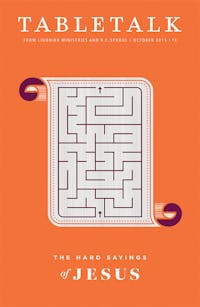
Request your free, three-month trial to Tabletalk magazine. You’ll receive the print issue monthly and gain immediate digital access to decades of archives. This trial is risk-free. No credit card required.
Try Tabletalk NowAlready receive Tabletalk magazine every month?
Verify your email address to gain unlimited access.
Difficult words, no doubt. No less for John’s readers than for Jesus’ hearers. For many that day, it was too much, so they walked away. Just the day before, Jesus fed five thousand people from five loaves of bread and two fish (John 6:1–14). Once they were well fed, having enjoyed the benefits of Jesus’ miracle, the people concluded, “This is indeed the Prophet who is to come into the world,” and they decided that He should be king (vv. 14–15). What a difference a day makes.
Truly, truly, I say to you, unless you eat the flesh of the Son of Man and drink his blood, you have no life in you. Whoever feeds on my flesh and drinks my blood has eternal life, and I will raise him up on the last day. For my flesh is true food, and my blood is true drink. Whoever feeds on my flesh and drinks my blood abides in me, and I in him. (John 6:53–56)
What did Jesus mean by eating His flesh and drinking His blood? To the Jewish crowd, this was offensive. After all, eating blood is unclean according to the Mosaic law (Lev. 17:12). For people today, His words can sound obscure and off-putting, even if not taken literally. Though we may not walk away because of them, we might practically ignore them.
The meaning of Jesus’ words is found a few verses earlier where Jesus says something similar. Instead of talking about eating flesh and drinking blood, He says, “For this is the will of my Father, that everyone who looks on the Son and believes in him should have eternal life, and I will raise him up on the last day” (John 6:40). Jesus uses graphic language to point His hearers to the true instrument of eternal life—faith in Him alone. Jesus invites us to find everlasting nourishment in Him by faith. Similarly, Jesus said, “This is the work of God, that you believe in him whom he has sent” (v. 29). In the wilderness, God provided manna for the Israelites (vv. 31–32; Ex. 16), and with it their faith was tested. They had to believe that God would give them exactly what they needed every day, so they were told not to collect more than they needed each day. Manna foreshadowed the bread to come—Christ. We must believe that in Him we have all we need. Jesus’ words cause us to consider that we can only live through Him.
Jesus said, “I am the bread of life” (John 6:22). Jesus’ words call us to lay hold of Him alone by faith—the One who shed His blood for our sins and who rose from the dead to give us eternal life. He is the true bread that comes down from heaven. In Him, we “taste and see that the Lord is good” (Ps. 34:8).
